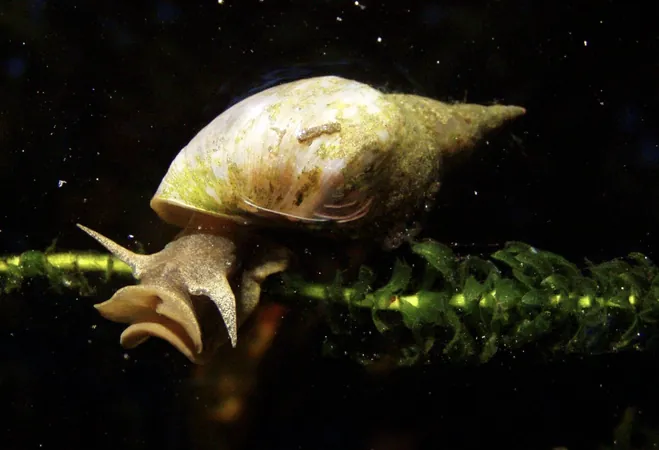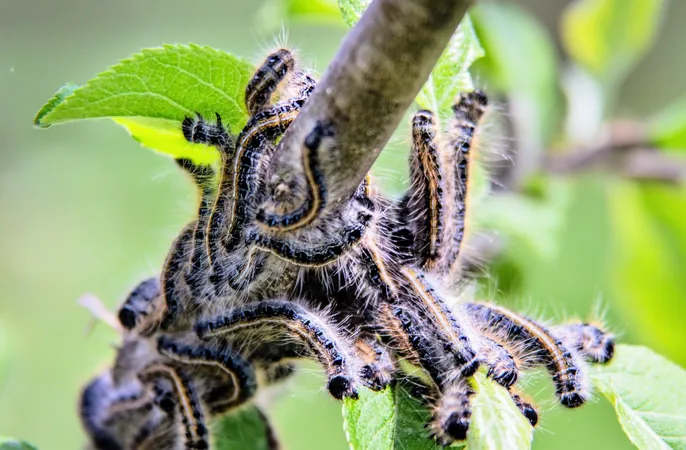
Snails in Distress: Groundbreaking Study Reveals Anxiety Can Extend Beyond Vertebrates!
2025-06-30
Author: William
The Hidden World of Anxiety in Unlikely Creatures
Anxiety isn’t just a human experience! While we often associate this psychological state with humans, research now reveals that even snails can experience anxiety. A recent study from the University of Modena and Reggio Emilia dives deep into the anxious behaviors of the great pond snail, Lymnaea stagnalis, opening our eyes to the emotional lives of invertebrates.
What Causes Snail Anxiety?
Anxiety, which prompts heightened vigilance in response to perceived threats, can lead to avoidance behaviors. In essence, it prepares us for uncertainty. But what happens when these feelings become excessive? Researchers are exploring the evolutionary origins and neural mechanisms behind anxiety disorders to pave the way for better treatments. Until now, the study of anxiety in invertebrates has been largely neglected.
Pond Snails: Surprising Subjects of Study
In a novel approach, researchers exposed these snails to water containing fish scent—an unmistakable predator cue. The results were startling! The snails exhibited clear signs of distress, including increased aerial respiration and prolonged recovery times when flipped over.
Anxiety Responses That Last
Even after the stressor was removed, the signs of anxiety lingered, suggesting that snails can maintain an anxious state rather than merely displaying conditioned reflexes. One of the study's authors, Veronica Rivi, noted how exposure to fish water enhanced the snails’ memory formation, indicating that these creatures might be more cognitively sophisticated than we thought.
Fear Overrides Feeding
In an intriguing twist, when snails encountered fish water along with a food source like carrot, their feeding responses shifted to fear, demonstrating a complex learning ability. Rivi and her team also experimented with the anxiolytic drug alprazolam, which effectively reduced anxiety-like responses in snails without causing sedation.
Breakthrough Findings with Major Implications
This research not only establishes that snails can show anxiety-like behaviors akin to those of vertebrates but also suggests these responses can be studied and treated similarly. With the potential to reveal universal mechanisms of anxiety across species, this work may influence future studies on other invertebrates and their emotional responses.
A Call for Further Research
The findings mark a significant leap in our understanding of emotional experiences beyond our own species. These insights could inspire new avenues in anxiety research, particularly in how different life forms manage stress and fear.
As Rivi stated, "Our research offers new insights into the biological basis of anxiety and sets the stage for future pharmacological studies." Who knew that even the humble pond snail has a story worth telling? This discovery not only broadens our perspective on emotion but also reinforces the idea that feelings may be much more universal than we ever imagined!









 Brasil (PT)
Brasil (PT)
 Canada (EN)
Canada (EN)
 Chile (ES)
Chile (ES)
 Česko (CS)
Česko (CS)
 대한민국 (KO)
대한민국 (KO)
 España (ES)
España (ES)
 France (FR)
France (FR)
 Hong Kong (EN)
Hong Kong (EN)
 Italia (IT)
Italia (IT)
 日本 (JA)
日本 (JA)
 Magyarország (HU)
Magyarország (HU)
 Norge (NO)
Norge (NO)
 Polska (PL)
Polska (PL)
 Schweiz (DE)
Schweiz (DE)
 Singapore (EN)
Singapore (EN)
 Sverige (SV)
Sverige (SV)
 Suomi (FI)
Suomi (FI)
 Türkiye (TR)
Türkiye (TR)
 الإمارات العربية المتحدة (AR)
الإمارات العربية المتحدة (AR)